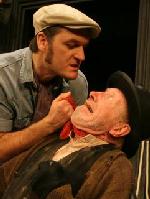SEARCH
REVIEWS
FEATURES
NEWS
Etcetera and
Short Term Listings
LISTINGS
Broadway
Off-Broadway
NYC Restaurants
BOOKS and CDs
OTHER PLACES
Berkshires
London
California
DC
Philadelphia
Elsewhere
QUOTES
On TKTS
PLAYWRIGHTS' ALBUMS
LETTERS TO EDITOR
FILM
LINKS
MISCELLANEOUS
Free Updates
Masthead
Writing for Us<
A CurtainUp  London Review
London Review
 London Review
London Review Steptoe And Son In Murder At Oil Drum Lane
by Brian Clover
|
If you're cleaning your teeth . . . clean mine as well.
---- Albert Steptoe |

Jake Nightingale as Harold and Harry Dickman as Albert
(Photo: Robert Day) |
Alan Simpson and Ray Galton, who conceived and wrote the series, deserve comic genius status on the strength of Steptoe alone. But they were also responsible for the best shows of Tony Hancock, creating for him a character similarly tormented by the distance between what he wants to be, and what he knows he is. They take some of the elements of Hamlet and play them for laughs.
Now Murder in Oil Drum Lane surfs in on the wave of comedy nostalgia that has given us treatments of the Goon Show and Round the Horne. But instead of reviving the show, Galton, working with comedy veteran John Antrobus, brings it up to date and offers us, and possibly himself, a kind of closure on it.
It is some thirty years since Harold escaped, having been convicted of his father's murder. He returns home to the scene of the crime, now preserved by the National Trust as an example of just how dire British life was in the Dark Ages, to encounter his father's ghost and play out the key moments of his life.
Jake Nightingale brilliantly reproduces the voice and manner of the original Harold, (Harry H Corbett) and Harry Dickman's Albert almost persuades us we are watching the ineffable Wilfred Bramble. Viewers will gain much pleasure from seeing these simulacra of venerable comedy heroes living and breathing in the set lovingly re-created by designer Nigel Hook.
But sadly the play itself is not as satisfying as the performances. Galton and Simpson were masters of the 30 minute format, not for nothing was their other hit show entitled Hancock's Half Hour -- but opening Steptoe out to a full two hours reveals limitations. Some of the additional material is lame and dated and violates the essential naturalism of the concept. Harold's removal from school is abrupt and unconvincing. Selling him to Hitler for propaganda purposes is neither funny nor plausible, nor is keeping him in a cellar for two years to avoid the draft, though there may be genuine historical examples of both. Nazis are not as intrinsically hilarious as the writers think. You have to be Mel Brooks to get away with lines like: "Warsaw's not in Germany;" "It soon will be." The female characters remain shallow caricatures, despite the vivacity of Juliet Howland and Alyson Coote's performances, reflecting one weakness of the original series.
The serious, psycho-dynamic, undertones of the material - achieving identity through denial of the parent, the absence of the mother - are hinted at, but left un-explored. More worrying is the apparent softening of Albert: he ruined Harold's life, it seems, out of love. He even kisses Harold's, albeit drugged, face and says, "I love you, son." One can imagine Wilfred Bramble's malevolent gargoyle expression on hearing this. Love there may have been between them, but love of a much darker and damaging kind. Readers should be warned: there is a hug. And no Hercules.
|
STEPTOE AND SON IN MURDER AT OIL DRUM LANE
Written by Ray Galton and John Antrobus Directed by Roger Smith With: Jake Nightingale, Harry Dickman, Laurence Kennedy, Alyson Coote, Juliet Howard Design: Nigel Hook Lighting: Richard G Jones Sound: Clement Rawling Composer: Christopher Madin Running time: Two hours 10 minutes with one interval Box Office: 0870 060 6637 Booking to 22nd April 2006 Reviewed by Brian Clover based on 23rd February 2006 performance at the Comedy Theatre, Panton Street, London SW1 (Tube: Piccadilly Circus) |





